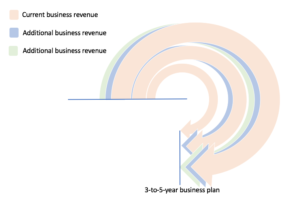Enhancing Business Value Through Recurring Revenue Streams
Introduction
The business landscape in the UK is bustling, with an estimated 5 million businesses for sale at any given time. However, only a select few—around 50 businesses each year—manage to sell for more than £1,000,000. This statistic can be daunting for business owners who aspire to achieve such valuations. The average age of an owner when a business is sold is 57, and it typically takes about five years to prepare a business for sale. If these numbers seem overwhelming or distant, there are viable alternatives to enhance the value of your business and most importantly ensure its future success.
The Challenge: Achieving High-Value Exits
Achieving a high-value exit is a significant challenge for many business owners. The statistics are clear:
- On average 5,000,000 businesses are for sale in the UK at any time.
- Only 50 businesses annually sell for more than £1,000,000.
- The average owner is 57 years old at the time of sale.
- It takes approximately 5 years to prepare a business for sale.
These figures highlight the competitive and time-consuming nature of preparing a business for a successful and lucrative sale.
Building for the Future: Creating Recurring Revenue Streams
Instead of solely focusing on preparing for a sale, business owners can enhance their company’s value and secure its future by creating additional recurring revenue streams. This approach not only makes a business more attractive to potential buyers but also provides financial stability and growth opportunities in the interim.
Benefits of Recurring Revenue Streams
- Increased Business Valuation: Recurring revenue streams can significantly boost the overall valuation of your business. Consistent and predictable income is highly attractive to buyers, as it reduces risk and demonstrates steady cash flow.
- Financial Stability: Recurring revenue provides a stable financial foundation, allowing you to manage operations more effectively and invest in growth opportunities without solely relying on one-time sales or seasonal income.
- Customer Loyalty and Retention: Recurring revenue models often involve subscription services or long-term contracts, which enhance customer loyalty and retention. This not only secures a steady income but also builds a strong customer base.
- Scalability: Many recurring revenue models, such as subscription services, memberships, or maintenance contracts, can be scaled efficiently. This scalability allows for growth without a corresponding increase in operational complexity.
- Market Differentiation: Offering unique recurring services or products can differentiate your business from competitors. This uniqueness can be a selling point when it comes time to attract buyers.

By increasing the number of revenue streams either in your business or using profits from the business to build external recurring revenue streams as part of a staged and focused business plan.
Strategies for Implementing Recurring Revenue Streams
1. Subscription Services
Implement subscription services for products or services that customers need on a regular basis. Examples include software-as-a-service (SaaS), product replenishment subscriptions, or access to exclusive content.
2. Membership Programs
Create membership programs that offer exclusive benefits, discounts, or services to members. This approach works well for retail businesses, gyms or health spa’s, and or professional services.
3. Service Contracts
Offer service contracts for ongoing maintenance, support, or consultancy. This model is effective for businesses in the technology, automotive, and home services industries.
4. Licensing and Royalties
If your business has proprietary technology, content, or products, consider licensing them to other companies. This can generate ongoing royalty income.
5. Leasing or Rental Models
For businesses with high-value equipment or property, leasing or rental models can provide a steady income stream. This approach is common in the real estate, equipment leasing, and vehicle rental industries.
Conclusion
While the path to selling a business for over £1,000,000 in the UK is challenging, creating additional recurring revenue streams offers a practical and effective alternative. This strategy not only enhances your business’s value but also provides financial stability, customer loyalty, and growth opportunities. By focusing on recurring revenue, business owners can build a more robust and attractive business, ready for a successful future whether they choose to sell or continue growing.
For those feeling daunted by the traditional route to high-value business sales, exploring and implementing recurring revenue models is a proactive step towards a prosperous and secure business future.
If you have any questions or need assistance in developing recurring revenue streams for your business, please feel free to contact me.
At ActionCOACH we have tried and tested processes’s to help scale your business to be a more valuable and sustainable enterprise. One such example is our six steps program, starting with a business and moving through six stages of business growth to get to the point where the business is woking for you or you can opt to sell the business. https://www.youtube.com/watch?v=crwueFHvMi4&t=25s
If you would like to know more lets meet for an initial chat- Use my calendly link to book a call https://calendly.com/chrisbrown_huntingdon/30-min-intro-call
Note: The statistics and strategies mentioned in this white paper are based on industry data and best practices as of 2024.





